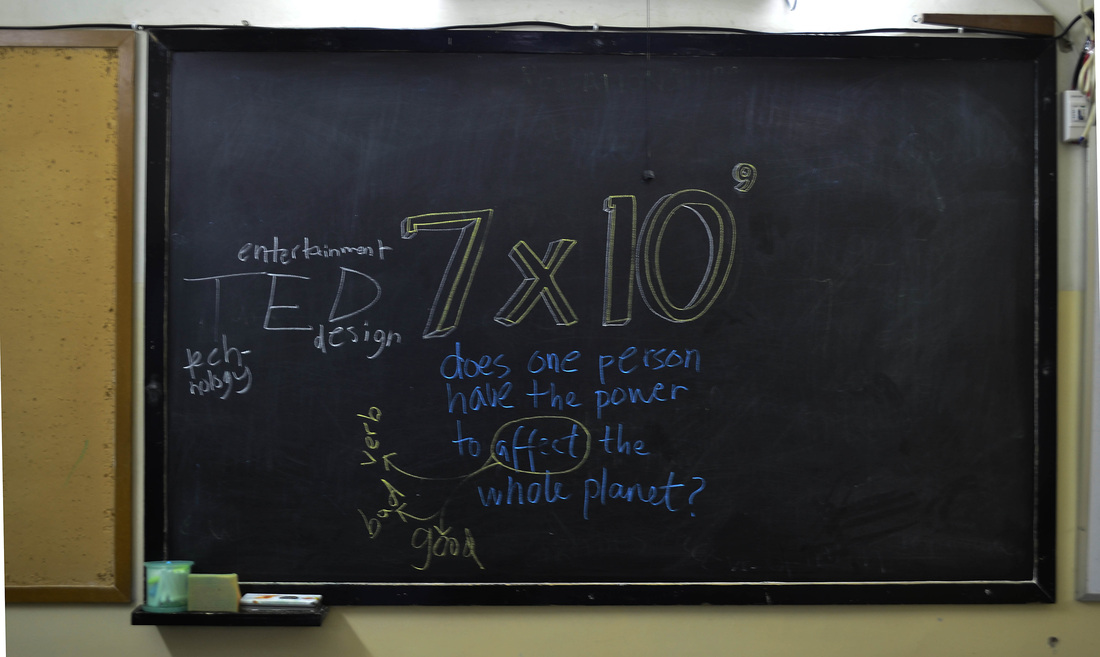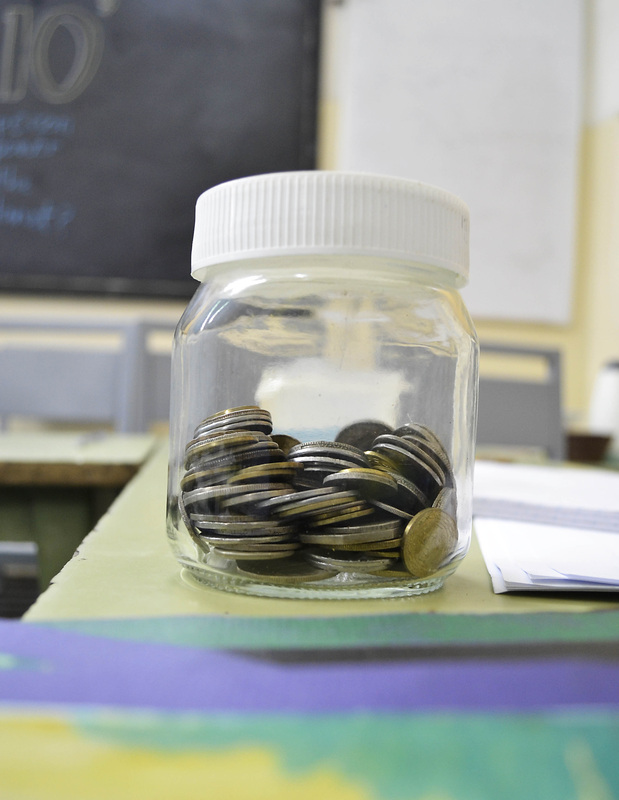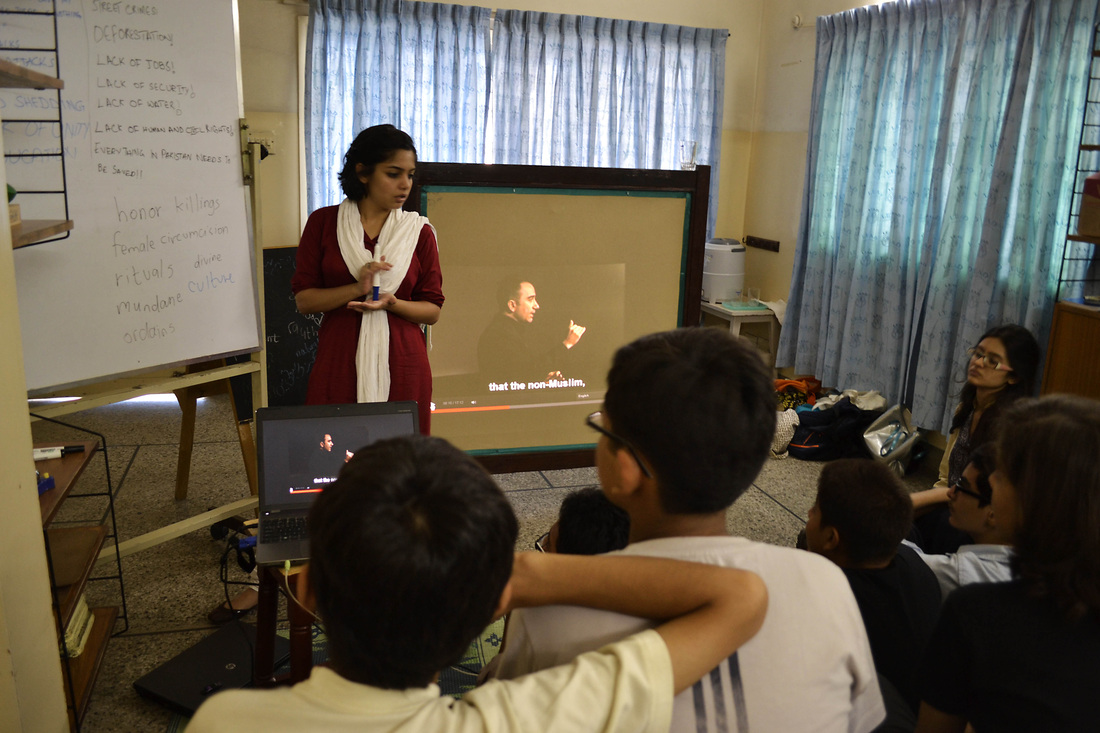The day began right where the previous one had left off, with the completion of the reading of and excerpt from J.K. Rowling's 2008 Commencement Address at Harvard University. I was pleased and impressed by the fact that the kids had done a thorough job of making their handouts "filthy," as they had been instructed. Almost everyone had underlined and highlighted the more difficult parts of the passage. Maliha drew attention to a powerful sentence in the speech: "We touch people's lives simply by existing."
"Do we?" Maliha asked. "How can one person affect someone or everyone else on the planet?"
Both Mohtashim and Faiq believed that one person did not have the power to cause such change. "But there are so many people in the world!" Mohtashim argued.
From here, Maliha got the group to focus on exactly how many people there were in the world. Nobody was really sure of what the human population was and, so, Maliha told them. The group was asked to imagine what the number meant and how big it was in the scale of things. Participants talked about the significance of being one in seven billion. Is the effect of one person as such a small fraction of humanity insignificant, or does it add up because we are not alone and are not the only ones performing the same actions?
Since most of the examples the group came up with involved negative impacts, Maliha explained that individuals could positively affect everyone, too. She linked this with a part of the excerpt that talked about inner and outer realities. Using examples of people like Steve Jobs, she showed how the ideas of these people (their inner realities) had radically changed life as we know it (our outer reality).
Before the rest of the text was interpreted, the group's collective confusions regarding a couple of words were addressed. As instructed, the kids had looked up the definitions of words they had had trouble understanding and scribbled them down on their handouts.
One interesting word the group had trouble with was 'agoraphobia'. While the participants seemed to understand what the fear was about after looking up the definition, they could not quite grasp why the condition was defined as abnormal. Taking advantage of this situation, Maliha started a discussion about what normalcy meant and how these concepts were subjective. She then drew attention to the connotations of similar words and how they slightly altered the meanings of things. This led to an impromptu activity where Ayesha, our aspiring war reporter, was assigned to report a startling story involving all the residents of Karachi suddenly wearing bright pink. Maliha explained that if the story was reported using the words 'weird' and 'strange' (even if she felt that it was so), it would be bad reporting because Ayesha would be using subjective language and dragging her opinions into things. On the other hand, using the word 'unusual' would be completely fine, as that is an objective term.
Yet another word was 'apathy'. Maliha asked the participants to share their feelings when they had first heard about target killings and ethnic violence in Karachi and compare them to what they now felt about these things. Most of them admitted that they did not have the same feeling of shock, horror, and anger they once used to. This, Maliha explained, was apathy, and it was dangerous because it made people stop thinking about things that they needed to think about. This was later connected to a line in the text that spoke of people being 'willfully unimaginative' regarding controversial things, and how this was also a dangerous thing.
To tie up all the concepts mentioned in Rowling's speech, the group did a role-playing activity. Mohtashim played a young Thomas Edison, while the rest of the group assumed roles of Edison's friends, enemies, rivals, critics and onlookers. Edison, hoping to make his inner idea of a light bulb an outer reality, presented everyone with his invention. Time and time again, however, the invention failed. Edison would then receive a mixture of encouragement, discouragement and scorn. Time and time again, he would be given the choice of either ceasing his attempts or continuing to persevere. After choosing the latter many times, the light bulb finally worked and his endeavour ended up becoming a pivotal moment in human history.
During the previous day's session, the kids had been asked to bring something they had in their room that had sentimental value to them and show it to the group. These things would then be placed in the Idea Room to emphasize that it was their space. Shiza brought a stuffed bear she had been given on her first birthday. Ruquiea proudly showed off her great collection of old, foreign coins.
In the last 45 minutes of the day's session, Maliha introduced the group to TED talks. They they gathered around a makeshift projector screen to watch a talk titled "Faith versus tradition in Islam" by Turkish journalist Mustafa Akyol. The idea that cultural practices are sometimes confused to be religious was discussed using honour killings and female circumcision as examples. The concepts of secular and non-secular governments and the pros and cons of each were discussed. Maliha compared the secular police that was once prevalent in Turkey to the enforced head-covering of women in Saudi Arabia regardless of their faith and it was concluded that enforcement was wrong.
Zohra summed up the day's session pretty well. "The TED talk, the dictionary meanings for some words threw their state of minds into a serious, confused flux," she said. "It was provocative!"
- Asad



 RSS Feed
RSS Feed